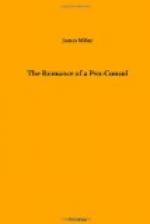It was full day when the assault did take place; otherwise Sir George would hardly have lived to describe it. He went back with spirit on the details, more armour of youth to be placed in the scabbard of age. One item held a small essay on the influences which determine human action in a crisis of life or death. He was speaking of the feeling that seized him when spear after spear cut into his flesh. Here was a struggle between mind and body, each determined to conquer—a study in the inner sanctuary; but how began the fight?
With two of his men, Sir George was on the march, notching trees by the way, so that the rest of the party could follow. At a turn they found themselves beset by a swarm of blacks, who had gathered in strength, determined to act against so small a force. Not many of the warriors could be seen at the outset, the rough ground sheltering them. But there they were, and in a most warlike humour.
A spear clove the air, singing their menace, as they yelled it in a hundred raucous voices. Scare shots, fired by Sir George, had no effect, not even when an incautious warrior was winged as an object-lesson. The Aborigines grew bolder, leaping hither and thither in the attack—evil spirits of the bush. The sight they made, all pigments, was expressed in the shout of one of Sir George’s men, ‘Good God, sir! Look at them!’
The cry rose from behind a rack, where Sir George had ordered the man and his comrade to seek shelter. Fortunately, a series of rocks made a natural parapet to the right, and in a degree in front. Sir George, his gun empty at the moment, placed himself on the exposed left position. The spears rained round him, as if they were falling from the clouds. Things could not go on thus for long, and the natives planned to end them.
A superbly built fellow, lighter of skin than his companions, arrogant of air, showed to the front, evidently a general in command. He clambered, shouting the lust of battle, on to the summit of a rock, not more than thirty yards from the spot where Sir George lay. Then he swung a spear, with agile trick, and it grazed the hem of the white captain’s coat. It would have done more, had not Sir George by instinct, which is ever alert, jerked himself free of its path. Another spear, from the same supple hand, just missed his breast, striking the stock of his gun. This was too near for comfort and the future well-being of the expedition.
Sir George passed his empty gun to the Englishman handiest, with the direction ‘Please re-load it.’ He had tried to do that himself, but his cramped position made it difficult to ram home the powder and ball. For his own gun, he snatched an unshot one which the man was struggling to release from its cover. In the hurry, piece and cover got entangled, but, with a wrench, Sir George tore the two apart. His plan of campaign was settled; he advanced to the rock where the light-coloured native had head-quarters. In bold initiative, there remained the only hope for Sir George and his following, against imminent massacre. Would it be a moral victory, won by a simple advance on the rock, or would it be necessary to strike? He had hesitated, as yet, to shoot straight; and he trusted still to avoid that extreme measure.




